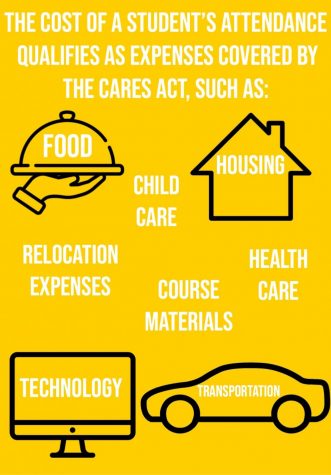

App state students who missed the mark on initial CARES Act funding now qualify for emergency grants, as stated in an email sent to students May 14.
The act first excluded young adults aged 17-21 still dependent on their parents for support and not making enough money to file taxes, typically college students. With the inclusion of the Higher Education Emergency Relief Fund, college students are included in grant allocations through their universities.
HEERF provides more than $14 billion toward emergency funding for higher education. More than $6 billion must go directly to students for expenses, “related to the disruption of campus operations due to the COVID-19 crisis,” in the form of financial aid grants, according to nasfaa.org . These grants do not have to be paid back nor are they counted towards or included in any financial aid package or college loans.
Processing of funds is said to begin immediately after submitting an application and is referred to as a “refund.” Refunds will be awarded typically within 3-5 business days, on Tuesdays and Thursdays.

App State received $15,927,932. Half will be provided directly to students as HEERF grants.
The CARES Act legislation identifies qualifying expenses to be covered by the grant as the cost of a student’s attendance, such as:
The U.S. Department of Education has defined eligibility criteria for a CARES Emergency Grant as follows:
Ineligible students are directed to apply for assistance through the Mountaineer Emergency Fund.
Students not eligible may need to complete their 2020-21 FAFSA before applying again.
Funds received by students must be paid directly by the university and are separate from initial refunds from the university for students living on-campus or paying for a meal plan.
Allocations will vary based on individual situations, but the university said , “our distribution plan is designed to help the most students with the greatest financial need.”
To apply, complete the instructions by the university found here . App State advises graduating seniors to apply as soon as possible. The application is open until July 31, 2020.
Leave a Comment Donate to The Appalachian ContributedWe hope you appreciate this article! Before you move on, our student staff wanted to ask if you would consider supporting The Appalachian's award-winning journalism. We are celebrating our 90th anniversary of The Appalachian in October 2024!
We receive funding from the university, which helps us to compensate our students for the work they do for The Appalachian. However, the bulk of our operational expenses — from printing and website hosting to training and entering our work into competitions — is dependent upon advertising revenue and donations. We cannot exist without the financial and educational support of our fellow departments on campus, our local and regional businesses, and donations of money and time from alumni, parents, subscribers and friends.
Our journalism is produced to serve the public interest, both on campus and within the community. From anywhere in the world, readers can access our paywall-free journalism, through our website, through our email newsletter, and through our social media channels. Our supporters help to keep us editorially independent, user-friendly, and accessible to everyone.
If you can, please consider supporting us with a financial gift from $10. We appreciate your consideration and support of student journalism at Appalachian State University. If you prefer to make a tax-deductible donation, or if you would prefer to make a recurring monthly gift, please give to The Appalachian Student News Fund through the university here: https://securelb.imodules.com/s/1727/cg20/form.aspx?sid=1727&gid=2&pgid=392&cid=1011&dids=418.15&bledit=1&sort=1.
About the Contributor
Xanayra Marin-Lopez (she/they) is a senior journalism major and media studies minor from Clinton, NC.